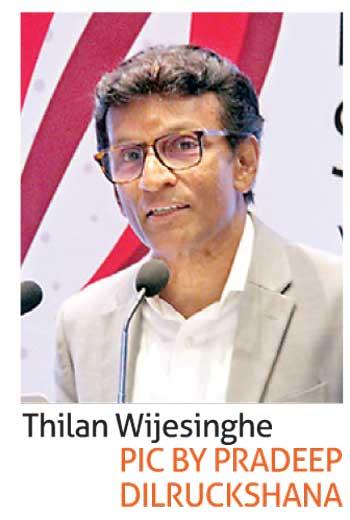30 Jan 2024 - {{hitsCtrl.values.hits}}
By Nishel Fernando
 While terming the Colombo Port City Economic Commission Act as an ‘aberration’ of the original Special Economic Zone concept, former Board of Investment (BOI) Chairman and Public-Private Partnership (PPP) Unit Head Thilan Wijesinghe called on the government to revamp the legislation, ensuring transparency and fair treatment to local investors.
While terming the Colombo Port City Economic Commission Act as an ‘aberration’ of the original Special Economic Zone concept, former Board of Investment (BOI) Chairman and Public-Private Partnership (PPP) Unit Head Thilan Wijesinghe called on the government to revamp the legislation, ensuring transparency and fair treatment to local investors.
Wijesinghe asserted the Colombo Port City legislation in its current state is “outright discriminatory”.
He commented while delivering a keynote speech at a breakfast forum themed ‘Economic Freedom and its Pathway to Prosperity’, organised by Colombo-based independent think tank Advocata Institute.
The spirit of the SPZ status of Colombo Port City was originally aimed at promoting ease of doing business for modern services, which could be gradually expanded throughout the rest of the country.
“The current version of the law we have at the moment is an aberration of vision,” he said while stressing that the government needs to recognise PPP as an important source of foreign direct investment (FDI).
Wijesinghe recalled that when the PPP unit was functioning under the BOI, Sri Lanka attracted over 40 percent of FDI. He pointed out that US $ 28 million in technical assistance to develop the PPP sector was lost to the country with this ad hoc decision.
He also questioned the lack of transparency and basis of granting tax incentives, in particular under the controversial Strategic Development Project Act (SDP), which has weakened the BOI.
“While the BOI agreement was weakened, the SDP allowed wide exemptions. However, the SDP was not transparent. No export manufacturing projects were set up under the SDP,” he added.
During the 1995-2001 period, 750 new private investment projects were implemented under Section 17 of this BOI law.
Sri Lanka’s FDI net inflows, as a percentage of GDP, have remained stagnant for over two decades and have not grown after the end of the conflict in 2009. The FDI net inflows during the 20 years before the end of the conflict averaged 1.3 percent of GDP.
In the post-war era, he pointed out that the majority of FDI came in the form of retained earnings and debt.
Therefore, he asserted the need to rethink investment incentives based on the past experiences.
Further, Wijesinghe stressed on introducing anti-corruption provisions and digitising the investment approval process, to reduce corruption, which has become a major concern for foreign investors.
27 Oct 2024 8 hours ago
27 Oct 2024 27 Oct 2024
27 Oct 2024 27 Oct 2024
27 Oct 2024 27 Oct 2024
27 Oct 2024 27 Oct 2024